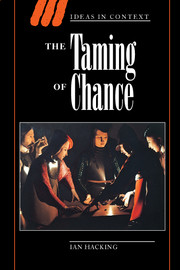Book contents
- Frontmatter
- Contents
- Acknowledgements
- 1 The argument
- 2 The doctrine of necessity
- 3 Public amateurs, secret bureaucrats
- 4 Bureaux
- 5 The sweet despotism of reason
- 6 The quantum of sickness
- 7 The granary of science
- 8 Suicide is a kind of madness
- 9 The experimental basis of the philosophy of legislation
- 10 Facts without authenticity, without detail, without control, and without value
- 11 By what majority?
- 12 The law of large numbers
- 13 Regimental chests
- 14 Society prepares the crimes
- 15 The astronomical conception of society
- 16 The mineralogical conception of society
- 17 The most ancient nobility
- 18 Cassirer's thesis
- 19 The normal state
- 20 As real as cosmic forces
- 21 The autonomy of statistical law
- 22 A chapter from Prussian statistics
- 23 A universe of chance
- Notes
- Index
- Ideas in Context
14 - Society prepares the crimes
Published online by Cambridge University Press: 05 June 2014
- Frontmatter
- Contents
- Acknowledgements
- 1 The argument
- 2 The doctrine of necessity
- 3 Public amateurs, secret bureaucrats
- 4 Bureaux
- 5 The sweet despotism of reason
- 6 The quantum of sickness
- 7 The granary of science
- 8 Suicide is a kind of madness
- 9 The experimental basis of the philosophy of legislation
- 10 Facts without authenticity, without detail, without control, and without value
- 11 By what majority?
- 12 The law of large numbers
- 13 Regimental chests
- 14 Society prepares the crimes
- 15 The astronomical conception of society
- 16 The mineralogical conception of society
- 17 The most ancient nobility
- 18 Cassirer's thesis
- 19 The normal state
- 20 As real as cosmic forces
- 21 The autonomy of statistical law
- 22 A chapter from Prussian statistics
- 23 A universe of chance
- Notes
- Index
- Ideas in Context
Summary
London, 16 July 1860 The statistical discoveries of one nation are the lights of all nations.
Despite the accidents of conflagrations, the unstableness of winds, the uncertainties of life and the variations in men's minds and circumstances, on which fires, wrecks and deaths depend, they are subject to laws as invariable as gravitation and fluctuate to within certain limits, which the calculus of probabilities can determine beforehand.
This holds of crimes, and other acts of the will, so that violation itself is subject to law.
Shall a system of fatalism be built upon this foundation?
No, for statistics has revealed also a law of variation.
Introduce a system of ventilation into unventilated mines, and you substitute one law of accidents for another.
These events are under control.
Some races, however, commit crimes of violence in greater proportion to other races.
Some classes are more dangerous.
[But] as men have the power to modify their race, they have the power to change the current of human actions within definite limits, which statistics can determine.
Words like these signal the connection between information and control. Statistical information leads to the discovery of statistical laws. We who collect the information change the boundary conditions and thereby change the laws of society. Such control of a human population seems to diminish its freedom. This thought did not foment issues about the moral dimensions of political action. Those were the self-confident days of that hymn in praise of industry and empire, the Great Exhibition at Crystal Palace. Instead of engendering political self-doubt, the connections between information, control and statistical law created a metaphysical quandary, which was called statistical fatalism.
- Type
- Chapter
- Information
- The Taming of Chance , pp. 115 - 124Publisher: Cambridge University PressPrint publication year: 1990

